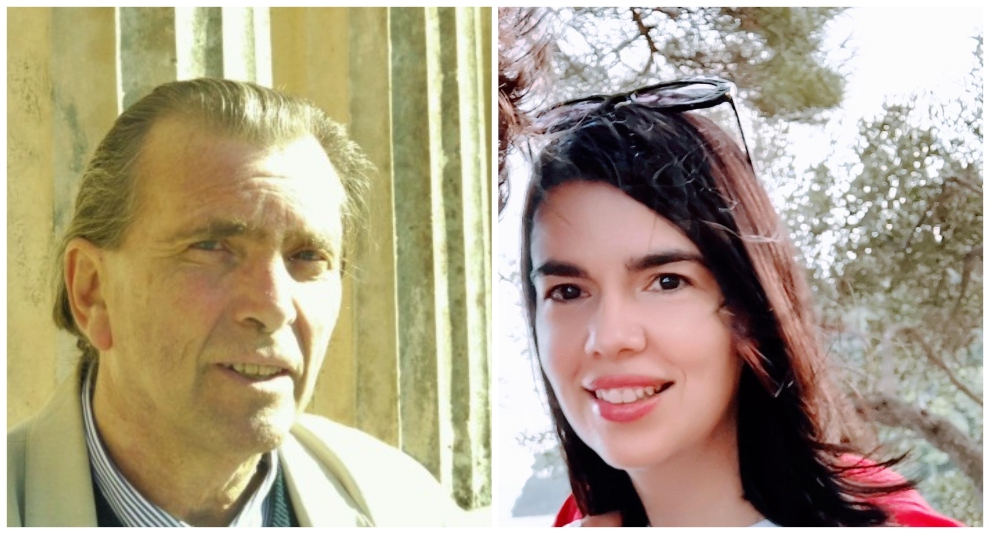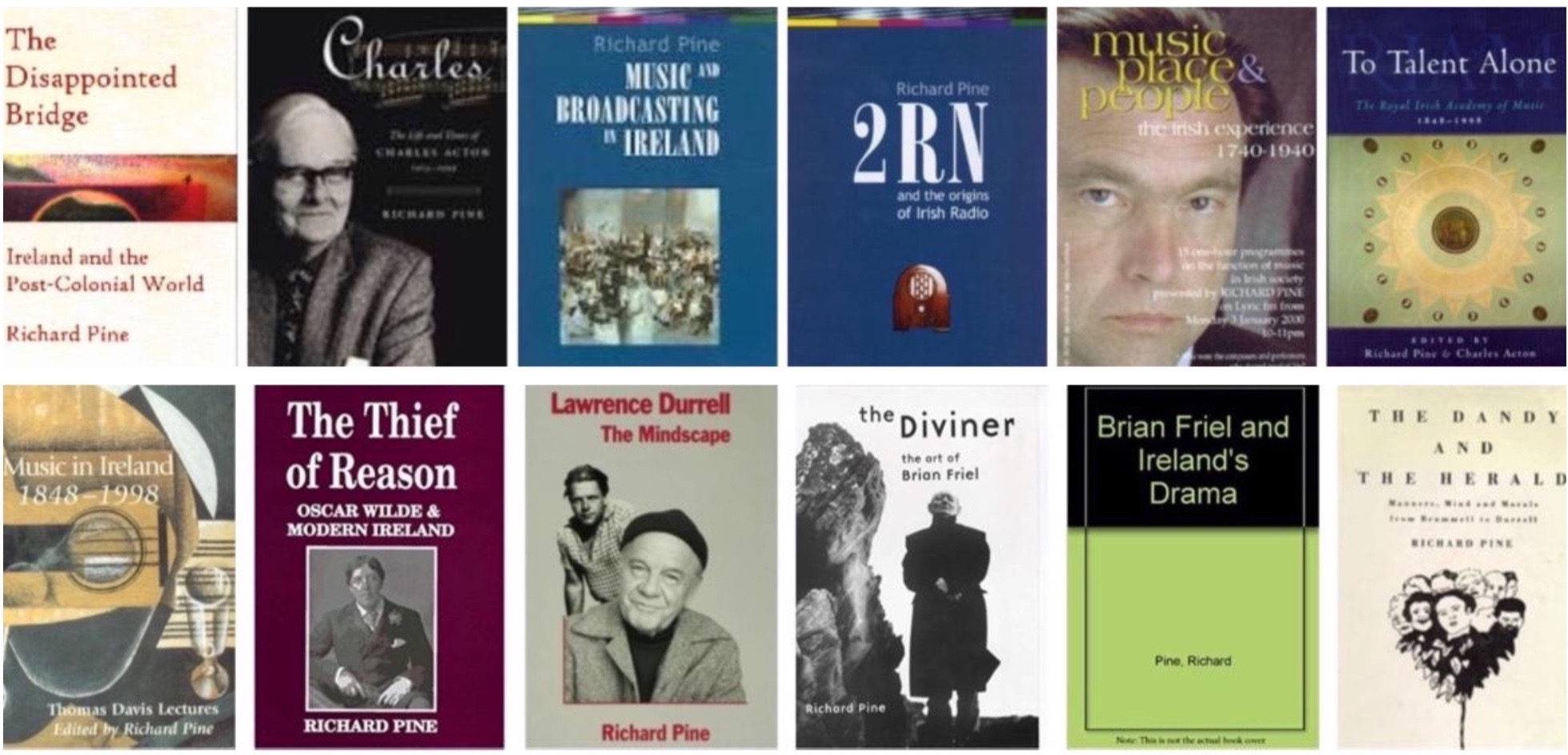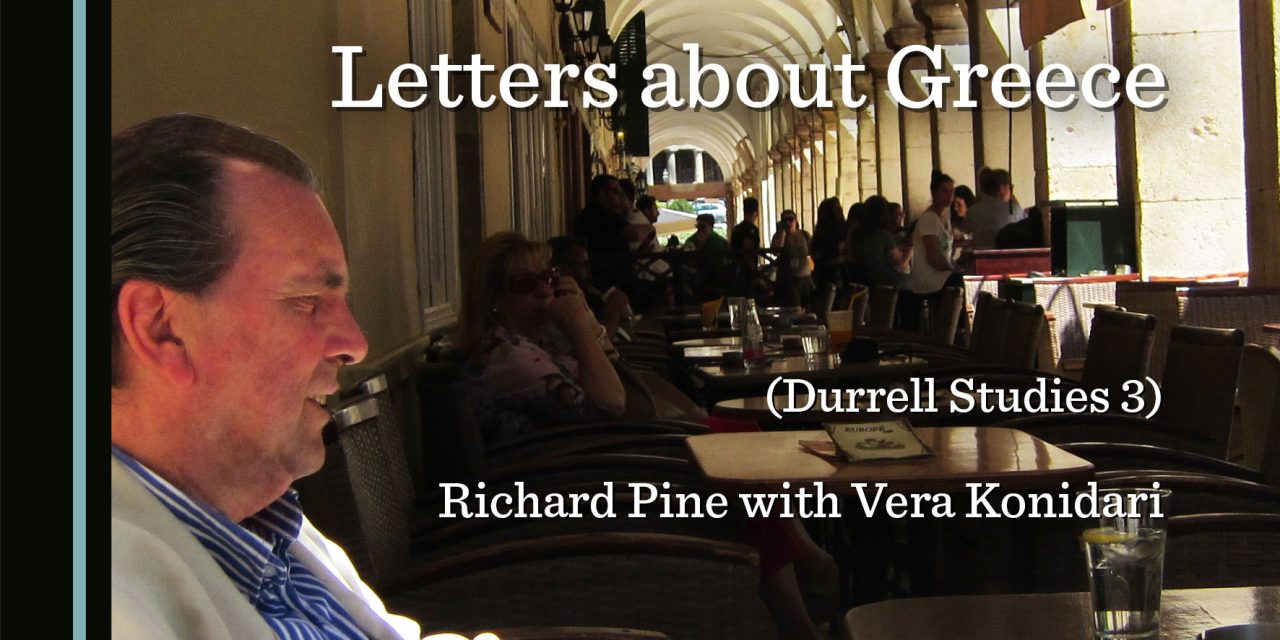The condition of Greece, ever since its establishment as a sovereign state in 1830, has been the subject of intense international debate, centring on its pivotal role in the Balkans. This has been aggravated by Greece’s economic hardships since 2010, coupled with a number of national, political and social issues. Richard Pine, who has lived in Corfu since 2001, was among the first international commentators to understand that “the Greek debt crisis was not so much about economics as about national identity, and that the measures imposed from outside threatened to undermine something more profound even than national sovereignty, something he calls Greekness”, as Denis Staunton, London Editor of The Irish Times eloquently put it.
Richard Pine has contributed “Letters from Greece” to The Irish Times since 2009 and also wrote a column “The Eye of the Xenos” for the Greek newspaper Kathimerini. His analysis and assessment of Greek social, cultural and political life is trenchant, up-front and passionate, based on his belief that one cannot love Greece without also mourning the fault-lines in bureaucracy and the dynastic politics which have dominated Greece since its inception. The Eye of the Xenos features a selection of his “Letters from Greece” and the entire “Eye of the Xenos”, in both English and a Greek translation. In the words of Helana Smith, Athens-based correspondent of The Guardian and The Observer, “with his roving ‘xenos’ eye Richard captures the essential spirit of Greece and, in so doing, evokes the schisms and strains of his adopted homeland. It takes lyricism, bravura and a certain tenacity to so deftly dissect a nation that rarely takes the commentary of ‘strangers’ well”.
On the occasion of the book’s publication, Reading Greece interviewed both Richard Pine and his traslator Vera Konidari.
Greece and Ireland: Where do the two cultures converge and what are the main points of divergence? Would it be plausible to talk about elective affinities between the two countries?
R.P.: It’s possible that the positions of Greece and Ireland on the peripheries of the European landmass have contributed to their present relationship with the EU. Both have been trying to “catch up” with the more advanced states in terms of modernisation and this also highlights the similarities in the two countries before they joined the (then) EEC in 1973 (Ireland) and 1981 (Greece).
There are many other characteristics from the more distant past: very strong religious faith, related very closely to folk lore and folk belief; strong, vital relationships of society with its environment; a predominantly rural society with poor infrastructure; and a very strong literary tradition originating in oral culture. There is also in both sociopolitical systems a pervasive clientelism which saps political vigour. Above all, perhaps, a history of being dominated by a more powerful neighbour for many centuries, and now trying to establish more diplomatic relations with the old enemy.
I think Irish people and Greek people understand each other very well and I also think they share a problem of not being well understood by the “northern” mindset, for example in Germany, Holland and Scandinavia.
I’m not sure I could go as far as to call this an “elective affinity” but the compassion between the two is very strong: if you compare two island writers, Liam O’Flaherty from Inishmore and Alexandros Papadiamandis from Skiathos, you’ll see the same mindsets. If you look at Irish novelists like John Banville and Anne Enright you’ll find some very striking echoes in the works of, say Ioanna Karistiani and Panos Karnezis.
Divergence: Irish society has modernised far more quickly and I think this is to its disadvantage. In financial terms it has been successful in attracting many multinational companies to make Dublin their European base, and it has established an International Financial Services Sector which we don’t see in Greece. It enabled Ireland to exit the financial crisis far more quickly and successfully than Greece.
But it has lost much of its sense of the personal and local identity that we still find in Greece. As a result, Ireland is a “larger” presence in the EU but whether that is a “good thing” is very debatable. I am a European but not a supporter of the EU.

Which are the main misconceptions about Greece in Ireland and in Anglo-Saxon countries in general? How has the narrative about Greece changed over the years? How does your book contribute to a more insightful understanding of the Greek people and culture?
R.P.: Despite an awareness of Greece’s classical past and the attraction of its antiquities, I’m sorry to say that the vast majority of tourists want nothing more than sun and sea. However much we may acknowledge Greece as the home of democracy, philosophy etc., Greece is a holiday destination and visitors possibly don’t even realise that there is a year-round society of real people living a vibrant culure when they are not waiting at table or cleaning bedrooms in resortotels. These tourists might as well be in Benidorm or Kusadasi for all their interest in Greek culture or lifestyle. Ironically, one of the factors that could dispel this perception (or blindness) is a development in niche tourism, in terms of food, wine, music and literature festivals, etc. The recent announcement about “war” as a new niche market is admirable as it will draw attention to Greece’s role in modern history. But the Greek tourist organisation does little to promote the development of such markets, and the lack of a unified export board diminishes the chances of getting Greek wines, foods and craftware into foreign supermarkets.
I would like to draw attention to one of the nice coincidences about this book: In 1970 my inaugural address as president of the University Philosophical Society at Trinity College, Dublin featured as a guest speaker Eleni Vlachou, the proprietor of Kathimerini. She was then living in self-imposed exile in London, having shut down her newspaper as a protest against the military dictatorship of 1967-74, just as her father, George, the founder of Kathimerini a century ago, had done during the Nazi occupation of Greece 1941-43. Little did I realise in 1970 that, almost fifty years later, I would be writing a monthly column (“The Eye of the Xenos”) for the English-language edition of Eleni Vlachou’s newspaper !!!
My book features a selection of the 100+ “Letter from Greece” which have introduced Irish people to these ideas over the past 12 years. I have, I think, made Irish people more aware of the strengths as well as the weaknesses of Greece and its cultures, and of the political realities of its relations with Turkey and the burden of the refugee crisis (even though the Greek community in Ireland has stated that I am not a philhellene because I have occasionally drawn attention to these weaknesses!)
The main part of the book, however, is my column for Kathimerini 2018-2020 which is now available for the first time in Greek, thanks to my valued and formidable collaborator Vera Konidari. These columns are, essentiallly, the “eye of the xenos”, commenting on Greek society as an outsider, and one living on the periphery of the periphery, more famiiar with the coastline of Albania (across the Corfu straits) than the Greek mainland! I would hesitate to say that my column was much use to Greek readers, but I hope that my celebration of cultural pinnacles like Dimitra Trypani’s music-drama Amíliti or the life of Alki Zei would have resonated with Greek people.
For the readers of the English edition, I do hope that what I said may have contributed to a wider appreciation of Greece’s virtues and failings – I was commenting on the environment, education, literature, the public service, from the point of view of a professional writer living in a village on an island which itself is atypical of Greek island life due to its “Venetian” history. A Corfiot perspective may have succeeded in showing the rest of Greece in a new light, and as Kathimerini English edition is distributed with the New York Times it would certainly have reached many readers who might not otherwise be in touch with Greek culture and life-style.
As in my previous book Greece Through Irish Eyes (2015) I could not have written a hagiography – the balance between “loving” and “mourning” has to be struck, or one would not be honest with oneself. Many of the difficulties that I see in Greece today are the result of the quest for “modernisation” which in my opinion reduces the quality of life and the personal dimension in favour of the “online” mentality. What I value most about Greek literature is its questioning of value-systems and value-judgements, its insistence on telling a personal story – from Karkavitsas’s The Beggar (1896) or Theotokis’s Slaves in their Chains (1922) right up to today’s Sophia Nikolaidou or Irini Spanidou. I wish there were more available in translation!
Which were the main challenges you were faced with while translating Richard Pine’s latest writing venture?
V.K.: Richard Pine’s text is a lively text with an eloquent language style which engages the readers’ attention. My main aim was to try to carry across into the Greek language the meanings without losing Pine’s original style.
However, I had to face certain challenges and overcome them in order to achieve that. For instance, there were phrases that alluded to certain facts which were probably common knowledge for British or Irish people, but sounded quite “obscure” for the Greek readers who would lack that particular knowledge. In that case, I either had to add the relevant information in the Greek text or substitute the phrases with Greek analogies. Certain word puns or idiomatic expressions were also untranslatable, in which case I opted for footnote explanations. As Richard Pine expresses himself clearly and powerfully, with humour and sarcasm, in certain instances I felt that those might not be appreciated by the Greek readers, but I followed Pine’s suggestion and I did not replace them with more “fine-sounding” Greek phrases. Overall, it has been a very rewarding experience, as I felt that translating The Eye of the Xenos for the Greek readers would be a great opportunity for them to see their own Greek affairs from a very different and fresh perspective, that is through the “eye of the Xenos”.
 Could translators act as cultural ambassadors fostering understanding between different countries and cultures?
Could translators act as cultural ambassadors fostering understanding between different countries and cultures?
V. K.: Certainly. I would like to use here Richard Pine’s analogy of a river. As he points out in The Eye of the Xenos “When I lecture to students of translation, I use the analogy of a river, full of crocodiles. The translator’s job is to carry meaning safely across this river by establishing a bridge, a metaphor, so that it arrives safely on the other side. One slip in nuance or inflection, and the meaning is lost, snapped up by the crocodiles”.
Even if they do not realise it, translators carry precious meanings across different languages and cultures, crossing the linguistic borders from one country to another and thus they become the “bridge-builders”, or cultural ambassadors.
**
Richard Pine is Director of the Durrell Library of Corfu. He is the author of many books on literature and music, including Lawrence Durrell: The Mindscape (1994/2005), The Disappointed Bridge: Ireland and the Post-Colonial World (2014), Greece through Irish Eyes (2015), Minor Mythologies as Popular Literature: A Student’s Guide to Texts and Films (2018) and Lawrence Durrell’s Woven Web of Guesses (2021). He has edited Lawrence Durrell’s novels Judith and The Placebo, and his uncollected prose, Endpapers and Inklings 1933-1988. He co-edited Islands of the Mind: Psychology, Literature and Biodiversity (2020) and Borders and Borderlands: explorations in identity, exile and translation (2021).
Vera Konidari teaches English at the 1st High School of Corfu, and she has previously lectured in the Department of Audio and Visual Arts and the Department of Informatics at the Ionian University, Greece. Her translations into Greek include Theodore Stephanides’ The Golden Face (2019) and Lawrence Durrell’s The Magnetic Island (2019). She co-edited Islands of the Mind: Psychology, Literature and Biodiversity (2020) and Borders and Borderlands: Explorations in Identity, Exile and Translation (2021), and is currently working on a biography of Theodore Stephanides.
A.R.
TAGS: LITERATURE & BOOKS | READING GREECE













